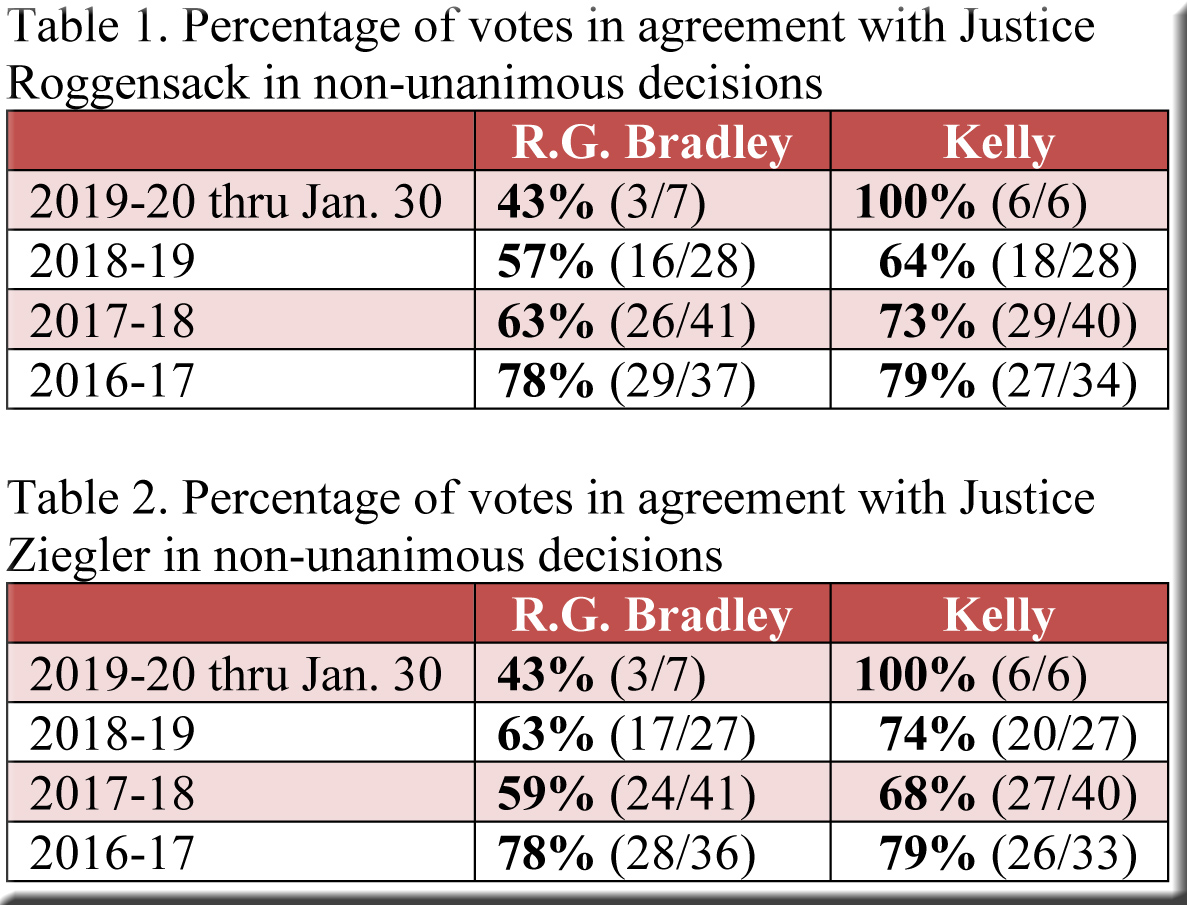Although Justice Daniel Kelly has established himself as a resolute member of the Wisconsin Supreme Court’s conservative majority, there appeared reason to surmise back in September of 2017—following his first term on the bench—that he would be more likely than the other new conservative justice, Rebecca Bradley, to chart an autonomous course on occasion.[1] To be sure, this was far from certain, based on the justices’ voting records for 2016-17. Even in non-unanimous decisions, Justices Kelly and Bradley voted together 97% of the time, more frequently than any other pair of justices.
Still, grounds remained for predicting that Justice Kelly might become the closest thing to a nonconformist among conservatives because of the votes that he cast in Fourth Amendment cases. While the court’s three most conspicuous conservatives—Justices Roggensack, Ziegler, and Gableman—almost never accepted Fourth Amendment arguments (3%, 9%, and 8% of the time, respectively), Justice Kelly did so in 38% of the votes that he cast. This exceeded considerably the percentage for Justice R. Bradley (27%) and prompted a post titled “Justice Kelly a Maverick?” in the autumn of 2017.[2]
Since then, though, the picture has changed, and it has done so ever more vividly. First, in Fourth Amendment cases decided during the next two terms (2017-18 and 2018-19), Justice R. Bradley favored Fourth Amendment arguments just as frequently as did Justice Kelly (33% of the time). Second, and more important, Justice R. Bradley has grown less predictably inclined than Justice Kelly to side with the court’s staunchest conservatives on a wider range of issues.
Expanding our gaze from Fourth Amendment cases to cases of all sorts, we can see in Tables 1 and 2 that Justices Kelly and R. Bradley voted with Justices Roggensack and Ziegler at nearly identical rates in non-unanimous decisions in 2016-17.[3] But the tables also demonstrate that, thereafter, Justice R. Bradley has been more independent minded regarding the conservative majority than has Justice Kelly.
This “independence gap” between Justices Kelly and R. Bradley became distinct in 2017-18, and it has reached dramatic proportions during the current term. In the seven non-unanimous decisions filed through January 30, 2020, Justices Roggensack and Ziegler voted together every time, and Justice Kelly sided with them invariably (except for Chris Hinrichs v. DOW Chemical Company, in which he did not participate).[4] Justice R. Bradley, on the hand, parted company with Justices Roggensack, Ziegler, and Kelly in four of the seven cases—both civil and criminal.
It will be interesting to see how persistently these developments endure over the remainder of the term. That is, to what extent will Justice Kelly continue to vote in virtual lockstep with Justices Roggensack and Ziegler, and will Justice R. Bradley maintain the more independent course that she appears to be navigating so far?
[1] Justice Bradley joined the court one year before Justice Kelly did.
[2] The figures are for 1995-96 through 2016-17.
[3] Justice Gableman retired in 2018, and Justice Hagedorn’s voting record is still very slim. Thus, we are comparing Justices Kelly and R. Bradley only to Justices Roggensack and Ziegler in these two tables devoted to the court’s conservative members.
[4] The figures for 2019-20 include State v. Donavinn D. Coffee (2017AP002292-CR), a fractured decision. For varying reasons, Justices Roggensack, Ziegler, Kelly, and Hagedorn all voted to affirm the court of appeals. Justices R. Bradley and Dallet joined a dissent written by Justice A. Bradley that would have reversed the court of appeals.

[…] Rebecca Bradley voted the same on non-unanimous decisions 97 percent of the time, according to an analysis by Alan Ball, a history professor at Marquette University. Both voted in sync with “the […]